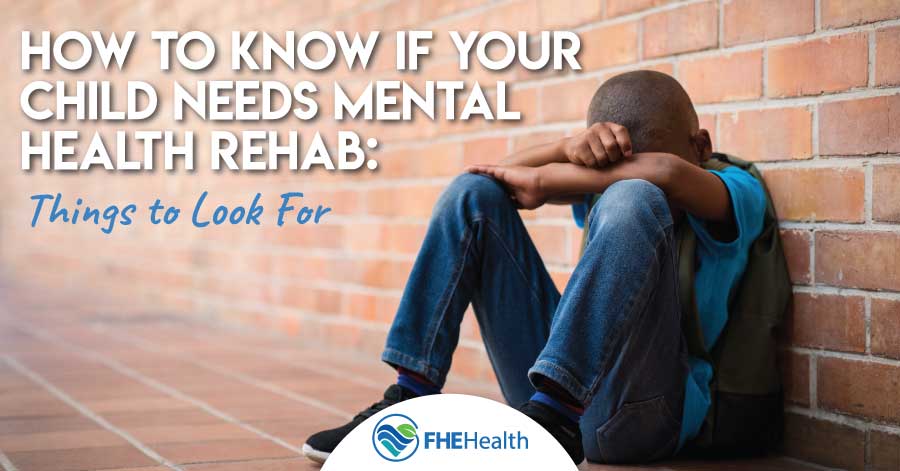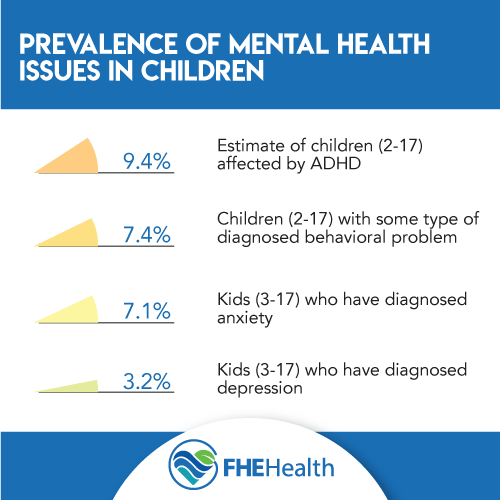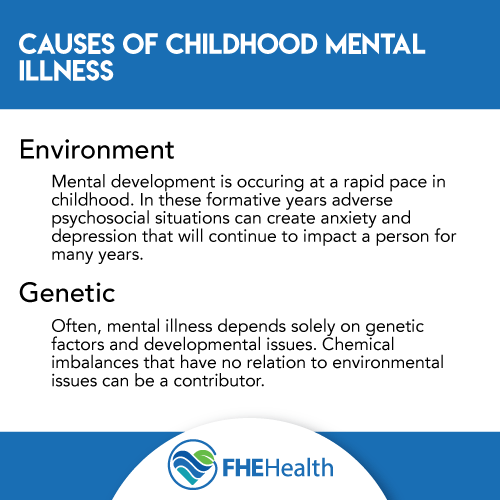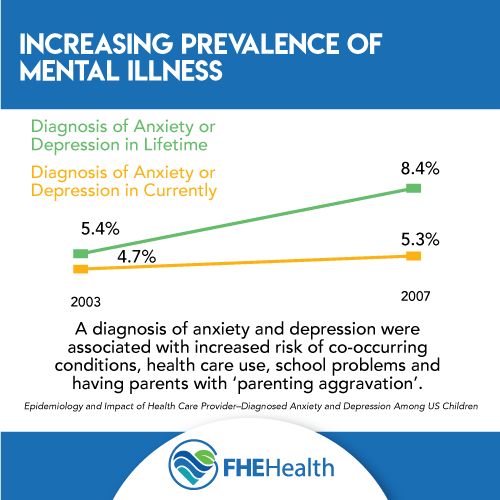
Children’s mental health disorders occur when there is a significant change in the way a child behaves, learns or handles their emotions. This often leads to distress of some type, creating difficulty in day-to-day tasks. Behavior disorders, anxiety and attention-deficit/hyperactivity disorders (ADHD) are the most common, though others can occur, including depression and bipolar disorder.
How Common Are Kids’ Mental Health Problems?
 Consider a few key statistics on children and mental health as reported by the U.S. Centers for Disease Control and Prevention. ADHD is the most common form of mental health disorder in children, impacting about 9.4 percent of kids ages 2 to 17, or about 6.1 million children. About 7.4 percent or 4.5 million children in the U.S. have some type of diagnosed behavior problem. The agency reports 7.1 percent of kids 3 to 17 years of age, or 4.4 million, have diagnosed anxiety and 3.2 percent of kids in that age group, or 1.9 million, have diagnosed depression.
Consider a few key statistics on children and mental health as reported by the U.S. Centers for Disease Control and Prevention. ADHD is the most common form of mental health disorder in children, impacting about 9.4 percent of kids ages 2 to 17, or about 6.1 million children. About 7.4 percent or 4.5 million children in the U.S. have some type of diagnosed behavior problem. The agency reports 7.1 percent of kids 3 to 17 years of age, or 4.4 million, have diagnosed anxiety and 3.2 percent of kids in that age group, or 1.9 million, have diagnosed depression.
Other conditions, such as schizophrenia, are less common. Still, onset of this condition can occur as early as age 14, and in some cases earlier. Childhood onset is considered rare, occurring in 1 in 10,000 children according to a study published by the U.S. National Library of Medicine. Depression occurs at a rate of about 2 percent in childhood but grows to about 4 to 7 percent of teens. Kids may also develop eating disorders and bipolar disorder during their teen years.
With mental health issues in children occurring so commonly, how does a parent know if their child has a condition or is simply experiencing traditional mental health growth and development?
Why Do Children’s Mental Health Issues Develop?
During childhood, a child’s physical and mental development is moving at its fastest rate. Changes in growth, mastery of things like how the body works and controlling emotions, as well as learning to communicate properly, are all developing rapidly. Children are also learning from their surroundings. In some situations, they are exposed to less-than-ideal conditions, resulting in psychosocial development that’s less trusting of others. Some children develop a lack of security in their surroundings, potentially contributing to anxiety and depression.
That’s not to say children who have mental illnesses develop them solely as a result of their surroundings. In many situations, genetic factors and poor development in the womb contribute to the development of mental illness as well. Parental factors, such as the family’s overall socioeconomic situation, the parent’s mental health and the type of supportive upbringing they have, also contribute. Simply put, there is no single cause of the development of mental health disorders in kids.
When Do Mental Health Issues First Start Presenting?
Do adults with mental illness present symptoms as children? Are children misdiagnosed often? In some situations, parents and doctors may not address otherwise common mental health illness symptoms because they believe they are behavior related. However, not all people will have symptoms at a young age.
Another study published by the U.S. National Library of Medicine found that older teens and young adults generally display some type of early symptom of mental health disorders, but few are actually treated for numerous years. More so, the study found early intervention may not stop the full development of these disorders, but it may reduce some severity and persistence later on life. Therefore, it’s important to consider how these conditions can be spotted early on.
What Are the Potential Symptoms Evident in Children?
The signs of mental illness in children are not easily recognized. Many times, they are not treated as seriously in children as they would be in adults simply because these early signs seem like just a behavior issue. Yet, the most common indications include:
- Poor performance in school
- Complaints of physical symptoms such as stomach aches and headaches
- Being bored frequently
- Behaviors that seem to be regressive, such as bedwetting or throwing a tantrum, at an older age
- Aggressive behaviors
- Self-harm
- Fear of gaining weight and significant exercising
- Smoking or using drugs, which can be a form of self-treatment for the disorder
- Thoughts of suicide
- Risk-taking behaviors or not being concerned about one’s own safety
These symptoms are in addition to the traditional symptoms associated with each type of disorder.
Are Mental Illnesses Treated Less Commonly in Kids?
Mental disorders in children tend to lack treatment, not just diagnosis, in childhood, and that can be a problem. If a doctor or a parent suspects a mental health disorder is present, they may be reluctant to require treatment, hoping the child will grow out if it. That’s not commonly the case. Many times, these conditions continue to intensify and worsen over time without treatment.
Doctors and some therapists may want to work with children through therapy sessions. Cognitive therapy treatment for some types of mental health disorders can help. Yet, many parents are not willing to use medication as a treatment option early on. This can also delay treatment.
What Are the Complications of Not Addressing Mental Illness?
 Early detection and treatment of mental health issues in children is essential for helping children learn how to cope and develop. The National Institute of Mental Health says that early detection and treatment can help to prevent the onset of more severe and lasting mental health problems. It can also help to minimize the risks to the individual, such as the threat of suicide.
Early detection and treatment of mental health issues in children is essential for helping children learn how to cope and develop. The National Institute of Mental Health says that early detection and treatment can help to prevent the onset of more severe and lasting mental health problems. It can also help to minimize the risks to the individual, such as the threat of suicide.
There is no cure for many types of mental health disorders. However, nearly all offer some treatment plan, which may include the use of medications to help the individual become stable and safe. It may also include the use of a variety of therapy types to help individuals to learn how to cope with the way they feel.
In children, who already have hormones that are unbalanced and whose brains are still forming important connections, it is very important to address this early on. Doing so can present opportunities for significant improvement in day-to-day life, helping the entire family to thrive.
When Should You Seek Help for a Child You Think May Have a Mental Health Disorder?
 It’s difficult to make the decision to seek help, but parents who feel their child needs it should seek out support as soon as possible. It’s hard to tell, when your child’s behavior is changing, if it is a form of development or a mental health concern. Yet, if a child’s behavior continues beyond a few weeks or is impacting the child’s physical well-being, it’s time to seek professional advice. If your child harms himself or herself in any way or threatens to do so, this is a cry for immediate help.
It’s difficult to make the decision to seek help, but parents who feel their child needs it should seek out support as soon as possible. It’s hard to tell, when your child’s behavior is changing, if it is a form of development or a mental health concern. Yet, if a child’s behavior continues beyond a few weeks or is impacting the child’s physical well-being, it’s time to seek professional advice. If your child harms himself or herself in any way or threatens to do so, this is a cry for immediate help.
In younger children, seek help if the child:
- Talks about fears and worries a lot
- Has tantrums that seem uncontrollable
- Doesn’t play with or have interest in things they formerly loved to do
- Repeats actions or questions things numerous times
- Cannot sit quietly
In older children, seek help if the child:
- Lacks energy
- Displays a loss of interest in friends, relationships or other activities
- Has talked about or attempted suicide
- Drinks alcohol or uses drugs
- Has periods of time with high energy levels and periods when they are unable to get out of bed
- Sleeps a lot or sleeps too little
If your child is displaying any type of sign or symptom of mental illness, take the time to speak to the child about their feelings. Speak to your child’s primary care doctor, then reach out to a licensed counselor and therapist to discuss your child’s needs at length.






